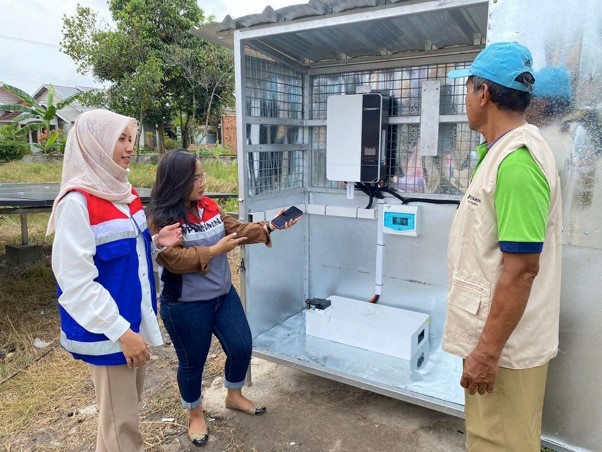Popular Reads
Top Results
Can't find what you're looking for?
View all search resultsPopular Reads
Top Results
Can't find what you're looking for?
View all search resultsContinual growth: 58 villages now utilizing renewables to grow their economies
Change text size
Gift Premium Articles
to Anyone
A
total of 58 villages across the archipelago are harnessing renewable energy to stimulate economic and social activities in their communities through the Village Energy Independence (DEB) program under Pertamina’s Corporate Social and Environmental Responsibility (CSER) umbrella.
The DEB program has expanded as of September to another 11 sites, six of these powered through solar power plants (SPPs) that were installed in collaboration with Pertamina New & Renewable Energy (PNRE), a subsidiary that specializes in new and renewable energy.
The six new DEB locations are: Singapure village in Lahat regency, South Sumatra; Tambakharjo subdistrict in Semarang, Central Java; Eka Jaya subdistrict in Jambi province; Tasikharjo district in Tuban regency, East Java; Larangan village in Cirebon, West Java; and Adat Kedonganan village in Badung, Bali. In addition to infrastructure development, the DEB program also empowers communities in accelerating energy equity by utilizing local energy sources to deliver power to remote villages.
Pertamina vice president corporate communication Fadjar Djoko Santoso said Pertamina would continue to provide access to renewables for all Indonesians so they ultimately achieved energy and economic self-reliance.
"We are continuing our journey to provide opportunities and accelerate the energy transition for the public, such as through the DEB program, which can be beneficial in stimulating economic activity," Fadjar said.
Tasikharjo village is one tangible example of Pertamina’s support for local economies through the DEB program. The village is using solar energy to power local micro, small and medium enterprises (MSMEs), such as Batik Sekar Tanjung, Jahit Sekar Tanjung and Ethical Creative Tasikharjo.
Meanwhile, Tambakharjo subdistrict is using solar photovoltaic (PV) panels to power the activities of the Pujasera Energy Culinary Kampung.
Solar energy is also being harnessed to support a variety of activities in Kedonganan village that impact the region’s community-based economy, including the operation of its reduce, reuse, recycle waste management facility (TPS3R).
Solar PV panels is also used to generate renewable energy in the villages of Eka Jaya, Larangan and Singapure to support the activities of aquaponics, aquaculture and agriculture MSMEs, including a coffee farm, as well as other MSMEs that stimulate economic and social development.
"The use of renewable and environmentally friendly energy, which never runs out, greatly enhances the productivity of coffee bean processing and other business production, early childhood schools and other public institutions, such as Posyandu [integrated health services posts],” said Singapure village head Aristo Hasan.
“This improves the quality of life for residents of Singapure village and also broadens our understanding of environmentally friendly, renewable energy that can help the government mitigate climate change," Aristo added.
Since Pertamina launched the DEB program in 2019, the program has generated benefits that include 170,880 watt-peak (Wp) of solar energy, 605,000 cubic meters per year of biogas and methane, 8,000 Wp of microhydropower, 6,500 liters of biodiesel per year and 16,500 Wp of solar-wind hybrid energy.
In addition to its energy impact, the DEB program has also positively impacted 3,201 households, contributing to an estimate of Rp 1.8 billion in added value per year through overall multiplier effect. The program has also contributed to reducing carbon emissions by 565,928 tonnes of carbon dioxide equivalent (CO2eq) per year.
As part of Pertamina’s CSER initiative, the DEB program supports the company's environmental, social and corporate governance (ESG) principles. The program is also in line with the Sustainable Development Goals (SDGs), particularly in achieving SDG 7 on Affordable and Clean Energy, SDG 8 on Decent Work and Economic Growth, and SDG 13 on Climate Action.
Moreover, the DEB program is a concrete action Pertamina is taking to contribute to the government's 2060 net zero emissions goal.










